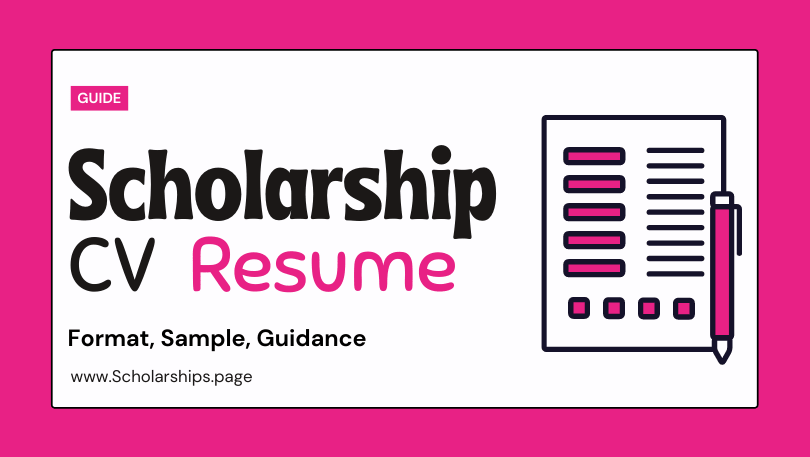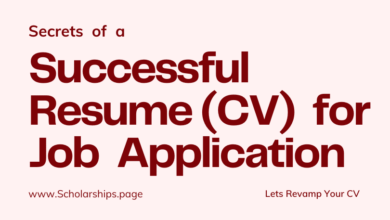
To win a scholarship is a dream for many. However, lots of students fail to win it. Sometimes because of the misguidance or lack of information provided is a cause. Many candidates fail to portray their image fully, be it educational or personal, which leads to losing many financial aid opportunities.
CV Definition:
A CV or a resume is a piece of information that highlights a candidate’s real image, experiences, and achievements. Also, concisely, it gives the recipient a chance to see your potential for the opportunity.
There is great competition between students regarding scholarships, it has become extremely essential to provide an outstanding CV; which does not only represent your true image but also outshine it from other candidates.
There is a high chance for a candidate to earn any scholarship if they are experienced enough. But this should not be bothered if a student doesn’t have any, with an accurate, organized, relevant and outstanding CV, they can achieve it as well.
Resume VS CV
So many people are often confused about these two terms CV and RESUME. Both do the same job, which is to provide an applicant’s information. But there is a difference in the format and length. A resume can be concise within a one-to-two-pages, while a CV can be more than two pages with more details. Most applicants tend to send a CV for the scholarship rather than a resume.
A scholarship CV should be written professionally, with every detail. Mostly, your selection would be based on the information given in the CV. Therefore, one should not let this chance go easily by providing a poor CV.
Think of a CV as a demonstration of an applicant’s qualifications, skills, experiences, goals, and achievements. Also, some other relevant information to boost the chance of getting a scholarship. To be more impactful among other students, one should create a GOOD CV and ensure to avoid misinformation, inaccuracy, and unorganized format.
An ideal CV must have a candidate’s accomplishments, personal, professional, academic information such as awards, honors, goals, experiences, employment history (if any, full-time or part-time), and volunteer ship. And all the information must be well organized and authentic.
Scholarship CVs also include a statement of interest and a cover statement, research history, teaching experience, and much more.
Step-wise Guide for Composing a Professional Scholarship CV
#1 Collecting the information
The most important thing before creating a CV is gathering all the related information. One should be considerate enough to collect every detail required, before writing the CV.
After this, the listing process starts. A candidate should make a list of academic history, accomplishments, awards, certificates, personal details, extra-curricular activities, and the other required information.
Now, a student should look at the list and analyze the relevant and irrelevant information. It is important to keep relevant information for the Scholarship CV and withdraw the irrelevant one.
#2 Organising the data
Organizing the data is highly appreciated, as everyone likes organized work. A CV must be organized in a way that attracts the reader. It should be clear, coherent, and neat. An applicant’s CV for a scholarship should represent their professionalism and objectivity. It should also put a great impact on the recipient.
While organizing the info, keep the order of achievements in descending order. Therefore, all the recent accomplishments should be written first and the others should be written afterward.
#4 Essential Information
Make sure to include all the information given below:
- Candidate’s Name
- Contacts details including email address and phone numbers
- Current address
- Nationality
- Date of birth
- Academic accomplishments
- Languages (mention all the languages you are fluent in)
- Internship experience, volunteer ship or job history (if any)
- All the marks achieved in school or college exams
#5 Add Acquired Skills:
- Make sure to state what you are good at
- Only mention things that are true
- Try to learn some skills to mention in your CV ( e.g. some basic computer skills)
It is highly important to highlight your objectives:
- How the scholarship will help you
- What are your future career goals
- How your goals are going be benefited from their opportunity
Refrain from adding information like this:
- Way too personal data
- Opinion in any political context
- Some religious comments
- Marital status
#6 Maintain accuracy of data
Make sure to provide authentic data. First, false statements will be morally wrong. Second, it would give them a bad impact on your personality. Remember, in order to outshine your CV, don’t jump to overshow or brag about yourself.
#7 Proofread Stage
- Don’t skip this part, as it gives you an understanding of your CV and also a chance to look if there is anything you are missing out on
- While proofreading, check the information carefully, your grammatical and spelling mistakes would not be underestimated. Even little mistakes do count
- You can even check the fonts, size, and color. Make sure your document demonstrates your professionalism.
key points:
Always write your CVs by yourself. Don’t ever give it to others to write it on your behalf. It is not a good suggestion. Your CV is dependent on your future and it should only be created by yourself.
In case you are having difficulty or have fear of not doing well enough, then you may check CV samples and get ideas from them; however, you should avoid copying them.
keep checking your work and compare it with the best CV examples you got through the internet. In the end, you may take opinions from others, but you should not opt for a readymade CV.
#8 Immppressive Format for a Scholarship CV
As aforementioned how important it is to organize the CV and make it error-free. Also, writing a CV in an excellent format would help you secure the scholarship.
Detailed CV format for Scholarship Application:
- Begin your CV with:
- First and last name
- A permanent home address which should include the postcode
- Contacts(home and mobile)
- Area code
- Authentic email address. And avoid adding fake emails
- Gender
- Date of birth which should be written to avoid format confusion
- Nationality
- You should finish your CV with:
- Educational achievements and job experience
- Your abilities, and relevant skills
- Referees and little intro with their emails
- Referees can be 2-3, but make sure they are ready to support you
Important notes:
- Make it simple, because complicated CV’S are hard to comprehend
- Your CV should be one to two pages long
- It is important to highlight key terms and headings
- You can underline the recent information as well

